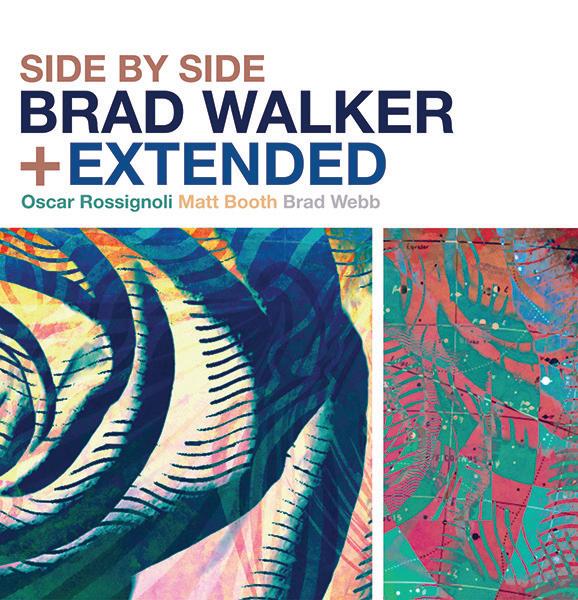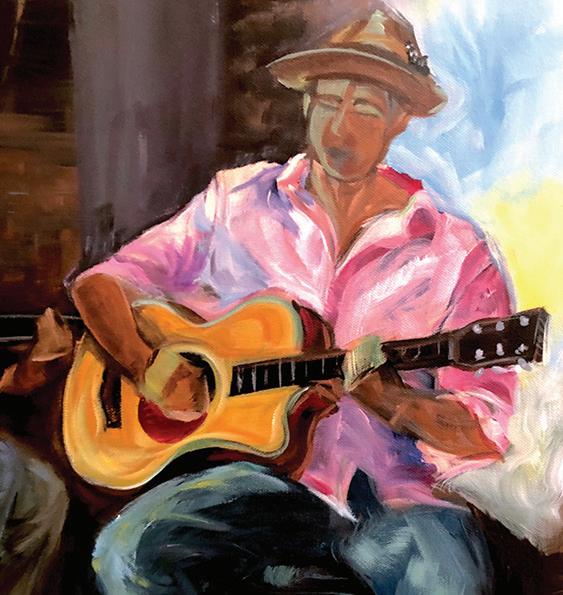
4 minute read
REVIEWS
territory. In steps Rossignoli, who reinforces that journey.
Booth’s bowed bass, generally lower tonal qualities and a kind of rumbling that begin Walker’s “Song #37: Alaya or “The Still Small Voices” give it a somber edge. As do the previous cuts, it evolves especially as Walker picks up the higher- and lighterpitched soprano sax.
Brad Walker + Extended Side By Side
(Independent)
On Side By Side saxophonist
Brad Walker teams up with the trio of musicians—keyboardist Oscar Rossignoli, bassist Matt Booth and drummer Brad Webb—known collectively as Extended. It’s a familiar setting for him—as well as them— having hooked up fairly often at live performances. They also share a certain like-mindedness in the way they musically converse on primarily original material coming from the pens of Walker, Booth and Webb.
The album opens with Booth’s lovely title cut. The exchanges between Walker and Rossignoli hold a sweetness accented by the keyboardist’s use of the upper notes of the acoustic piano. A roll of the drums marks the turning point of the selection as it, and particularly Walker’s tenor, becomes insistently passionate.
The calm and beauty of the first tune continue on Johannes Brahms’ “Intermezzo Op. 117, No. 2” that was arranged or perhaps more accurately described as re-imagined by Rossignoli. It too takes off in unexpected directions with the saxophonist heading out and the group entering into Latin jazz
The drummer’s brushes and the individual notes from Booth’s bass begin another gently serious cut, “Music for Dancers,” that almost suggests, thanks to Rossignoli, a classical piece. Walker’s breathy horn offers deep emotion.
A big change comes as wavering electronic effects, prayer bells and just a touch of drums fill Walker’s “Ouroboros.” Though the chant-like, repeated phrases of the piano echo the spiritual nature of the tune’s beginning, it too moves on to lift itself into the joyfulness of freedom.
Side By Side should stand as an ear-opener for those who have yet to discover these exceptional musicians who have become the rising stars on the New Orleans jazz scene today.
—GERALDINE WYCKOFF
Marc Stone
Shining Like a Diamond (Independent)
If I were Marc Stone, I’d have a hard time telling people what kind of music I played. He’s certainly a bluesman, but one of the more eclectic ones around. And his latest shows how many ways there are to make a hip, modern blues record without relying on the obvious guitarslinging thing.
The opener “Whatcha Gonna
Do” bears that out—starting as a somber acoustic blues, then shifting into an upbeat ’50s New Orleans vibe for the chorus. It’s an unlikely mix but it works: The verses ask what life’s all about, and the groove provides the answer.

The guest list here includes a few big local names, but he takes them slightly out of the comfort zone. Guitarist Leo Nocentelli guests on “Digitize” but plays bluesy electric slide instead of Meters funk (it’s also the first time he’s ever played on a song about internet disinformation). Jazz singer Meschiya Lake appears on a Stax-style R&B duet, “When We Were Cheating,” which isn’t your usual confession song: They sing that they had a great time cheating with each other and wish they were still doing it. George Porter Jr. and his trio are on “Love is Everything,” which has the slow-burn of a vintage Allman’s ballad. And “the Truth” features most of the band that’s played as the New Soul Finders—including the great singer Marilyn Barbarin, who’s been around since the ’60s—and plugs them into a modern bit of funky gospel.
Though a fine guitarist, Stone chooses not to play a lot of big solos, save for an expressive one on the title track. He’s more concerned with serving the song, and these songs are worth the care they get.
Marc Stone performs at Jazz Fest on May 5 at 11:15a Blues Stage.
—BRETT MILANO
surprise moments like the big solo on “Givin’ Up,” where the guitar is framed by what sounds like a vintage Mellotron.
Shawn Williams
Sulking in Love (Independent)
Singer/songwriter Shawn Williams has been prolific in recent years, and this is the least strictly country album she’s made—and the most strictly herself. If you know her previous albums, you can expect her to write unflinching songs about the more intense parts of love relationships—which is definitely the case here, and this time she plugs into a more eclectic musical setting that suits the tangled emotions of the songs.

One key element is producer Mark Howard, a longtime Daniel Lanois collaborator who worked on Peter Gabriel’s Us and the Nevilles’ Yellow Moon among other milestones. Like those albums, this one has a layered and textured sound where different instruments emerge in the mix—congas here, popping basslines there. He adds
He also draws the strongest vocals Williams has done on disc and allows her to get dramatic. The songs mostly fall into a clear storyline: After a string of impendingbreakup songs, “Lonesome Blues” is the album’s centerpiece, a six-minute ballad that she emotes for all it’s worth. The mood picks up just a bit afterwards: “Stars” is quite explicitly about sex, with a vocal distortion adding to the effect; while “Where I Stand” expresses hope for a new affair, the closest she’s come to writing an outright pop song. (The one outlier is “Society,” a protest about New Orleans gentrification, but it’s one worth including).
Williams visits some dark emotional territory here, but she makes it a fascinating place. And probably a healthier one to visit on record than in real life.
—BRETT MILANO
Marc Broussard
S.O.S. 4: Blues For Your Soul (KTBA Records)
With a portion of the proceeds from each of Marc Broussard’s S.O.S. philanthropic album series benefitting a different nonprofit, his latest installment targets Keeping the Blues Alive Foundation, which “fuels the passion for music by funding national relief grants and music education programs for students and teachers.” Keeping the Blues Alive Foundation’s founder is none other than blues-reining superstar Joe Bonamassa, who co-produced Blues For Your Soul and contributed his searing guitar on four cuts. Yet, it’s not another Bonamassaflavored record. It’s Broussard’s inaugural blues plunge with deep cuts from guitar icons Howlin’ Wolf, B.B. King, and John Lee Hooker; and legendary vocalists Bobby “Blue” Bland, Little Milton, and Al Green.

With a stacked line-up including co-producer and guitarist Josh Smith, keyboardist Reese Wynans, and Soulive’s Eric Krasno, it’s the best of both worlds: Broussard’s commanding soul pipes and torching soloists keeping the groove rolling.
If it’s the latter that resonates with the listener, then there’s plenty to appreciate in the arrangements. Son House’s “Empire State Express,” originally acoustically rendered, sports a jarring, bombastic, out-of-control intro. Little Milton’s “That’s What Love Will Make You Do” provides a slippery, funky foundation for Broussard’s swaggering vocals reminiscent of Buckwheat Zydeco. Fueled by Dennis Gruenling’s blistering harmonica howling, Broussard channels Howlin’ Wolf’s










